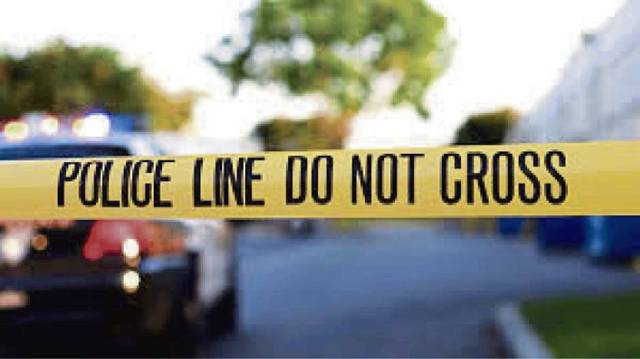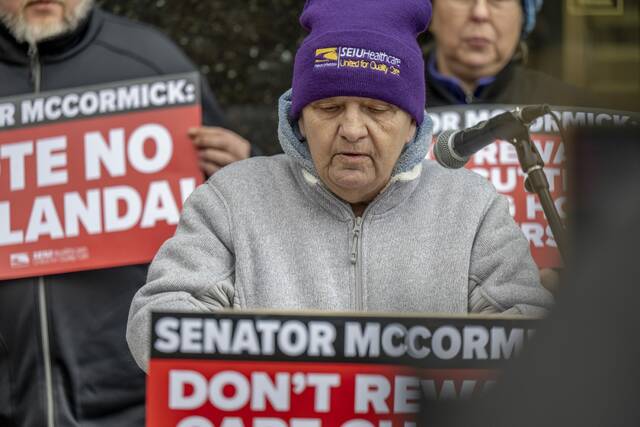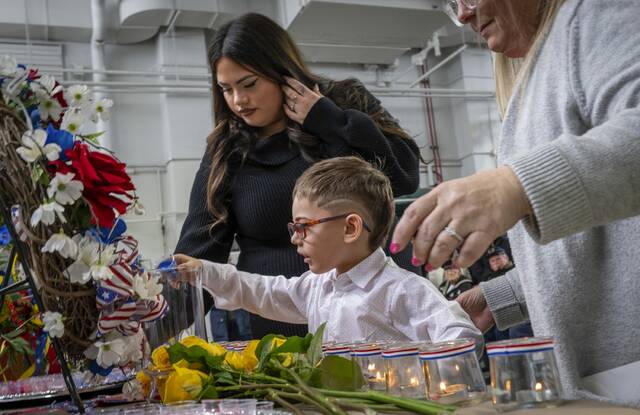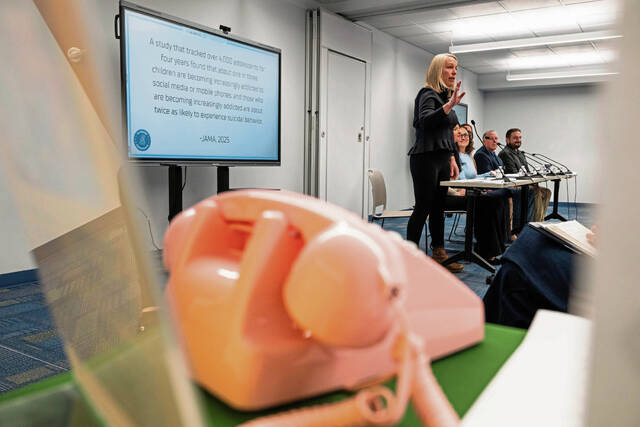A spate of suicides within the New York Police Department this past year put a renewed focus on the mental health of officers, but experts say the crisis has been simmering — and largely ignored — for years.
Unlike line-of-duty deaths, there is no government entity tracking officer suicides, and there is no clearinghouse for that data. Blue HELP, a nonprofit advocating for officer mental health, tallied 228 nationwide in 2019.
At least nine of those were within the NYPD, bringing what Mark DiBona, a retired police sergeant who worked in Massachusetts and Florida, called law enforcement’s “dirty little secret” to light in the nation’s largest police department.
“We see horrific things,” said DiBona, public information officer for Blue HELP. “How could that not bother anybody? And what we have to do when we clear that call is, we have to go to another call. And then we clear that call, we have to go to another call.”
That leaves officers with little time to decompress — to grapple with what they’ve seen.
“When you get home, it hits you like a brick wall,” DiBona said.
It’s the first year since Blue HELP began tracking that reported suicides have crested 200.
They far outnumber line-of-duty deaths and have for years, said Steven Casstevens, chief of police in Buffalo Grove, Ill., and incoming president of the International Association of Chiefs of Police.
“Part of the problem which relates to mental health … is it’s really kind of been ignored by our profession for quite a number of years,” he said.
“We’re a macho culture,” he continued. “We don’t want to ask for help. We don’t want to appear weak.”
And they don’t want to lose their guns.
“The firearm has sort of a symbolic meaning to an officer,” said John Violanti, a retired New York State Police trooper and professor at the University of Buffalo. “When a mental health issue is reported and their firearm (is) taken away, in a sense you’re stripping a person of an identity.”
Though it varies by state, that’s policy in some places, he said: An officer reporting depression or suicidal ideation can lose their service weapon and being confined to an office.
“There you are sitting in this room, people know that this has happened to you,” Violanti said. “No one wants to be called crazy, even though you’re not really crazy.”
Pittsburgh police Chief Scott Schubert said he has seen “too many” officer suicides in his 27 years in law enforcement, whether they were actively employed or retired.
“You have more officers killing themselves than are killed in the line of duty, and that’s why we have to do anything in our power to help them,” he said. “We have to help the people who are out there trying to help the public.”
For decades, Schubert said, the idea drilled into recruits at the academy was, “you have no emotions.” He called it “John Wayne Syndrome.”
“You’re high in your saddle; you can’t ask for help because it shows a sign of weakness,” Schubert said. “The weakness is not asking for help. It’s OK to not be OK — that’s the message we have to get to our officers.”
DiBona echoed that sentiment — it’s OK not to be OK.
“It’s OK to get help,” he said. “But it’s tough to get help, especially in the first-responder world.”
He knows it well. He’s helped dig through the rubble of the World Trade Center after 9/11 and worked countless homicides and sexual assaults. Working in Massachusetts and later Florida, he’s seen a lot of moments of pain.
Among many, some stick out, he said.
One night, DiBona was parked in the driveway of a fire station while crews were out on a fire call, when a woman pulled up next to him.
“She hands her 3-month-old baby to me and says, ‘My baby isn’t breathing,’ ” he said.
He tried CPR to no avail, and the infant was pronounced dead at the hospital.
“That baby basically died in my arms,” he said. He was in the emergency room when doctors broke the news to the infant’s parents.
He felt guilty — like he could have done something more. In his nightmares, the baby was in his cruiser, in his mailbox — talking to him, asking why he didn’t save it.
His boss told him to toughen up.
The totality of it all — the baby, the years of homicides and sexual assaults, the bad relationship with his boss — took its toll. His wife asked him to seek help. He said he couldn’t; he couldn’t appear weak.
It culminated with his wanting to die.
During a night shift, he penned a suicide note. Twice that night, he put his service weapon in his mouth. A buddy managed to talk him down.
DiBona went on to seek help and, later, became involved with Blue HELP.
Confronting the stigma
Violanti said he’s optimistic that a renewed focus on the issue will help reduce the stigma associated with mental health issues. Departments nationwide have been taking steps in the aftermath of the NYPD crisis.
In July, President Trump signed the bipartisan Supporting and Treating Officers in Crisis (STOIC) Act. The legislation renews Department of Justice grants for family support services for law enforcement.
Co-authored by U.S. Sen. Josh Hawley, R-Mo., and Sen. Sheldon Whitehouse, D-R.I., the bill allows funds to be used for mental health and suicide-prevention services. The legislation puts forth $7.5 million a year through 2024.
U.S. Reps. Guy Reschenthaler and Madeline Dean, both of Pennsylvania, introduced a companion bill in the House around the same time the Senate took up the act.
Rep. Mike Quigley, an Illinois Democrat, introduced the Law Enforcement Suicide Data Collection Act in July. The legislation would require the FBI to collect and publish data related to law enforcement officer suicides.
The bill was referred to the subcommittee on Crime, Terrorism and Homeland Security in August, where it has languished.
Also in August, Illinois Gov. J.B. Pritzker signed two pieces of legislation aimed at helping first responders get mental health treatment, including implementing confidential peer supports. They also require the Illinois Law Enforcement Training and Standards Board to develop curriculum addressing mental wellness and suicide prevention.
In New Jersey, state Sen. Steven Oroho sponsored a measure in November that would mandate regular training on suicide causes, warning signs and risk factors for law enforcement in the state, radio station NJ 101.5 reported.
Unions for first responders in Ohio are pushing for better coverage for post-traumatic stress disorder. The law, as it stands, requires an employee to have suffered a physical injury that’s tied to the disorder, according to the Dayton Daily News.
DiBona would go on to get help, but so many aren’t so lucky, as evidenced by the 228 law enforcement suicides reported to Blue HELP.
He cautioned, though, that that number could just mean an increase in reporting. The nonprofit relies on submissions from families or departments and news reports to track the numbers. Blue HELP reported 172 suicides in 2018.
More officers take their own lives than are killed in the line of duty — 132 in 2019, according to the Officer Down Memorial Page, which tracks those numbers.
DiBona called it the elephant in the room.
He said some law enforcement agencies won’t report suicides. They don’t consider it a line-of-duty death. The Officer Down Memorial Page does not count suicides in its numbers. He said he’ll sometimes reach out to departments where he’s heard there was a suicide, and they’ll tell him it was an accident — the officer was cleaning his gun and it went off.
“I’ve been in law enforcement since 1985. I’m throwing the bull(expletive) flag on that,” he said. “Suicide, right now, is the No. 1 killer in law enforcement. That’s really, really scary when you think about it, and it’s something a lot of people don’t talk about.”
It will take baby steps to change that, said Casstevens, the incoming IACP president, and it has to start at the top with police brass developing peer support programs and other avenues for support.
“Part of the culture needs to change,” he said. “Every police chief, every state police director, every county sheriff needs to develop a culture that says, ‘By the way, you’re a human being; you just happen to be a human being wearing a police uniform.’ ”








